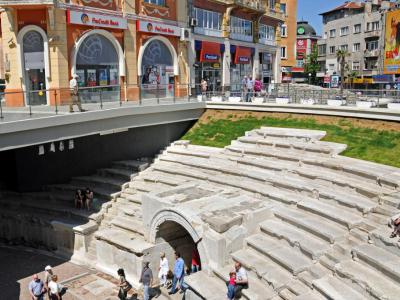
Stadium of Philippopolis, Plovdiv (must see)
Constructed during the early 2nd century under the reign of Emperor Hadrian, the Ancient Roman Stadium of Philippopolis stretches an impressive 240 meters in length. While its northern end has been uncovered and exposed to visitors, the remaining portion remains hidden beneath the city's main street.
Throughout its history, the stadium served as a venue for various events and spectacles. In ancient times, it witnessed thrilling gladiator fights, athletic competitions, and the renowned Alexandrian and Pythian games. Originally, these ancient Greek games were deeply rooted in religious traditions, dedicated to specific gods. However, during the Roman era, they evolved into sources of pure entertainment, and cities across the empire, including Philippopolis, invested in constructing stadiums, hippodromes for chariot races, and amphitheaters for gladiatorial contests. In the late 4th century, Emperor Theodosius I banned and condemned the Olympics as pagan rituals, leading to their demise.
The stadium's design features 14 rows of monolithic marble seats, offering a glimpse into the grandeur of its ancient events. An entrance below the seats leads to an underground passage or street, providing access to various corridors. One such corridor runs beneath the seating area and features a paved syenite floor, above which a drainage channel was ingeniously constructed. Some theories suggest that this underground passageway may have marked the beginning of a street encircling the fortified inner wall.
The Ancient Stadium of Philippopolis is an exceptional archaeological gem, representing an integral part of the city's Roman heritage. In recognition of its historical importance and architectural marvel, the Ancient Stadium of Philippopolis was designated a national cultural heritage site in 199.
Throughout its history, the stadium served as a venue for various events and spectacles. In ancient times, it witnessed thrilling gladiator fights, athletic competitions, and the renowned Alexandrian and Pythian games. Originally, these ancient Greek games were deeply rooted in religious traditions, dedicated to specific gods. However, during the Roman era, they evolved into sources of pure entertainment, and cities across the empire, including Philippopolis, invested in constructing stadiums, hippodromes for chariot races, and amphitheaters for gladiatorial contests. In the late 4th century, Emperor Theodosius I banned and condemned the Olympics as pagan rituals, leading to their demise.
The stadium's design features 14 rows of monolithic marble seats, offering a glimpse into the grandeur of its ancient events. An entrance below the seats leads to an underground passage or street, providing access to various corridors. One such corridor runs beneath the seating area and features a paved syenite floor, above which a drainage channel was ingeniously constructed. Some theories suggest that this underground passageway may have marked the beginning of a street encircling the fortified inner wall.
The Ancient Stadium of Philippopolis is an exceptional archaeological gem, representing an integral part of the city's Roman heritage. In recognition of its historical importance and architectural marvel, the Ancient Stadium of Philippopolis was designated a national cultural heritage site in 199.
Want to visit this sight? Check out these Self-Guided Walking Tours in Plovdiv. Alternatively, you can download the mobile app "GPSmyCity: Walks in 1K+ Cities" from Apple App Store or Google Play Store. The app turns your mobile device to a personal tour guide and it works offline, so no data plan is needed when traveling abroad.
Stadium of Philippopolis on Map






Sight Name: Stadium of Philippopolis
Sight Location: Plovdiv, Bulgaria (See walking tours in Plovdiv)
Sight Type: Attraction/Landmark
Guide(s) Containing This Sight:
Sight Location: Plovdiv, Bulgaria (See walking tours in Plovdiv)
Sight Type: Attraction/Landmark
Guide(s) Containing This Sight:
Walking Tours in Plovdiv, Bulgaria
Create Your Own Walk in Plovdiv
Creating your own self-guided walk in Plovdiv is easy and fun. Choose the city attractions that you want to see and a walk route map will be created just for you. You can even set your hotel as the start point of the walk.
Plovdiv Introduction Walking Tour
Plovdiv is Bulgaria’s second-largest city and one of the oldest continuously inhabited cities in Europe. Nicknamed "The City of the Seven Hills," it boasts over 8,000 years of history, with traces of habitation dating back to the 6th millennium BC. Straddling the Maritsa River in south-central Bulgaria, Plovdiv's thick cultural layers reveal influences from Thracians, Romans,... view more
Tour Duration: 2 Hour(s)
Travel Distance: 2.7 Km or 1.7 Miles
Tour Duration: 2 Hour(s)
Travel Distance: 2.7 Km or 1.7 Miles
Roman Ruins Walking Tour
If you’re a fan of Spartacus, a warrior turned slave and gladiator, who led an uprising against the Roman Empire in the 1st century BC, you probably remember him being called a “Thracian dog” by his enemies. Now, Thrace is the name of the region that encompasses present-day Bulgaria and the Western Part of Turkey. Plovdiv, once known as Philippopolis, is one of its most important cities.
... view more
Tour Duration: 2 Hour(s)
Travel Distance: 3.3 Km or 2.1 Miles
... view more
Tour Duration: 2 Hour(s)
Travel Distance: 3.3 Km or 2.1 Miles


